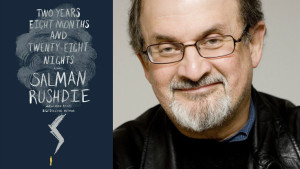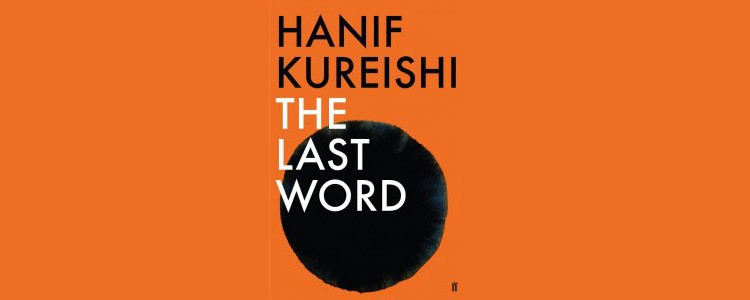Salman Rushdie, ” Two years eight months and twenty-eight nights: A novel”
 History is unkind to those it abandons, and can be equally unkind to those who make it. (p14)
History is unkind to those it abandons, and can be equally unkind to those who make it. (p14)
Salman Rushdie’s latest book, Two Years Eight Months and Twenty-Eight Nights is fiction like nothing before it. It is in the same class as Midnight’s Children —ground breaking literary fiction. Like the One Thousand and One Nights that it echoes in its title it is an intricate web of stories within stories, which showcase Rushdie’s technical, verbal and literary expertise. It is tales within tales spread over many centuries. It is about a Djinn, Duniya, and her love for a human – Ibn Rashd better known in the West as Averroes– and their family. ( Ibn Rashd was also the name Rushdie’s grandfather adopted and adapted to created his surname. “Rushdie” is not an inherited family name.)
He has created a world, sufficiently far-off in the future to create and discuss life today without really disturbing anyone’s equanimity in the present. It is very hard not to consider parts of it as being autobiographical, particularly when the authorial narrative intrudes to comment upon war, freedom, choices made as humans etc. Although in an interview with poet Tishani Doshi for the Hindu, Rushdie says categorically that autobiography is less and less important for him. He writes “something original and strange and unusual, and now there’s a mood for real life stories and so my book is the kind of anti- Knausgård”. ( http://bit.ly/1OmOcla ) Yet it is hard to separate the two parts of a man — the lived/autobiographical element and the literary fiction. For a man who has lived under the shadow of a fatwa, he has lived daily with the fear of death, much like Scheherazade the narrator of One Thousand and One Nights. In Rushdie’s case, it has made him fearless and outspoken. His speeches and articles on freedom of expression are admirable for their clarity and sharpness. For instance, listen to Rushdie at the India Today Conclave on 18 March 2012: https://www.youtube.com/watch?v=tNzGgYvz92s . It is this confident, breezy style evident in his literary experimentation. From his very first novel it has been evident but over time it has been taken to another level — another landmark in modern literary fiction for writers to admire, probably emulate.
In Two Years Eight Months and Twenty-Eight Nights Rushdie sparkles when his anger simmers through the novel, but at first glance it does not seem so to exist. It just seems like a magic realism tale where innumerable characters waltz on and off the page as and when they need to play their parts. There is little time for the reader to create a “bond” with any character save for a tenuous one with Geronimo the levitating gardener. It is more like a manifesto of Rushdie’s experiences as a writer. In a Paris Review interview of 2005, he had said: “My life has given me this other subject: worlds in collision. How do you make people see that everyone’s story is now a part of everyone else’s story? It’s one thing to say it, but how can you make a reader feel that is their lived experience?” (Salman Rushdie, The Art of Fiction No. 186 Interviewed by Jack Livings, The Paris Review, Summer 2005, No 174 http://bit.ly/1OmU2Tv ) This twelfth novel too is like an amalgamation of his experiences — cultural and literary — brought forth as a fabulist tale. It can be read for what it is at first reading or appreciated for its multiple layers. Richness of the text lies in the degree of engagement you can have with it as a reader. Ironically this novel makes a mockery of the information-overloaded age since many of the literary, cultural, political, historical and linguistic references are acquired over a period of time with reading and experience. The text cannot be deciphered by looking up references on Wikipedia. It won’t make the text work satisfactorily. Rushdie is delightfully unapologetic about blending languages and cultural references. He is what he is. This is it.
In the 2005 Paris Review interview Rushdie had been asked, “Could you possibly write an apolitical book?”. He had replied, “Yes, I have great interest in it, and I keep being annoyed that I haven’t. I think the space between private life and public life has disappeared in our time.”
If possible, read Two Years Eight Months and Twenty-Eight Nights in conjunction with Joseph Anton, his memoir. But read you must.
Here are links to some recent articles and interviews with Rushdie published to coincide with the launch of Two Years Eight Months and Twenty-Eight Nights.
Rushdie interviewed by Tishani Doshi in The Hindu, 13 September 2015. ” ‘I kind of got sick of the truth’ ” ( http://bit.ly/1OmOcla)
Nilanjana Roy’s wonderful analysis of the novel in Business Standard, 7 September 2015. “2.8.28: More hit than myth” ( http://bit.ly/1OmP0qe )
Salil Tripathi’s review-interview with Rushdie in The Mint, 4 September 2015. “Salman Rushdie: ‘I have no further interest in non-fiction’ ” ( http://bit.ly/1OmQnVW )
A profile in the Guardian. An interview conducted in Rushdie’s literary agent, Andrew Wylie’s office, by Fiona Maddocks, 6 September 2015 “Salman Rushdie: ‘It might be the funniest of my novels’ ” ( http://bit.ly/1OmNtAn )
Ursula le Guin’s review in the Guardian, 4 September 2015 “Two Years, Eight Months and Twenty‑Eight Nights by Salman Rushdie review – a modern Arabian Nights” ( http://bit.ly/1OmNKDF )
An interview with Alexandra Alter in the New York Times, 4 September 2015. “Salman Rushdie on His New Novel, With a Character Who Floats Just Above Ground” (http://nyti.ms/1OmPhJU )
“The novel is vividly described and rich in mayhem – Isn’t this mayhem reminiscent of the knowledge we carry in our head” Eileen Battersby in the Irish Times, 12 September 2015. “Two Years Eight Months & Twenty-Eight Nights review: Rushdie on overdrive” ( http://bit.ly/1OmPWec )
Salman Rushdie Two Years Eight Months and Twenty-Eight Nights Hamish Hamilton, an imprint of Penguin Books India, Gurgaon, 2015. Hb. pp. 290 Rs 599
13 September 2015






